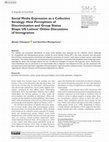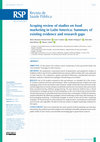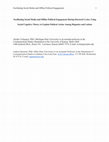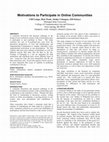Papers by Alcides Velasquez

Journal of Communication Technology, 2022
Individuals’ ability to use social media effectively, efficiently, and appropriately is increasin... more Individuals’ ability to use social media effectively, efficiently, and appropriately is increasingly important as these platforms become a common source for news and political expression. Differences in social media skills have important implications for politics, potentially generating a democratic divide. The present study examines the extent to which an individual’s perceptions of information navigation and social skills, two dimensions of social media skills, are related to social media political expression through cross-cutting exposure and pro-attitudinal exposure. Survey results show that social media skills are positively related to social media political expression through pro-attitudinal exposure, and social media skills hold a direct negative relationship with social media political expression. Implications of a social media skills divide and its relationship with social media political expression are discussed.

Online political activity takes many forms. Most research has heavily focused on the effects of t... more Online political activity takes many forms. Most research has heavily focused on the effects of these online behaviors on political participation in platforms such as Facebook or Twitter. This article focuses instead on WhatsApp, and compares how self-effects and acculturation theories have different predictions with regard to the mechanisms that explain the relationship between Latinxs’ political expression on this mobile instant messaging application and political participation. Results showed that Latinxs’ political expression through WhatsApp is related to their offline political participation. However, the direct and mediated relationship through group solidarity is dependent on political talk ethnic heterogeneity. The relationship among self-effects on acculturation processes is discussed as one potential explanation for understanding the complex ways in which perceptions of ethnic group solidarity, political talk ethnic heterogeneity, WhatsApp political expression, and offlin...
Signo y Pensamiento, 2014
Journalism & Mass Communication Quarterly, 2020
This study examines the role that group consciousness plays in driving corrective action. Drawing... more This study examines the role that group consciousness plays in driving corrective action. Drawing from an online survey of Latinos in the United States ( N = 588), it tests the relationships among group consciousness, perceived media bias, proattitudinal selective exposure, and political participation. Results show support for a serial mediation model where the relationship between group consciousness and political participation runs through perceptions of media bias and proattitudinal selective exposure. Proattitudinal selective exposure also mediates the relationship between group consciousness and political participation independently. Theoretical contributions to corrective action and the role of minority groups in American politics are discussed.

Social Media + Society, 2020
The visibility and association affordances of social media facilitate their potential use for col... more The visibility and association affordances of social media facilitate their potential use for collective action, especially for marginalized and disempowered groups. Guided by social identity theory (SIT), this study examines how perceived discrimination and perceptions of personal and objective constraints on Latinos’ social status increase Latinos’ social media expression. The results indicate that increased perceived discrimination is associated with increased social media expression, especially for those who strongly endorse the use of collective strategies to improve the in-group’s status. Furthermore, status boundaries that are perceived to be impermeable due to objective and subjective barriers are also associated with increased social media expression, regardless of the participants’ reported need for collective action. The results are discussed regarding the relevant literature and theoretical implications are offered.

Revista de Saúde Pública, 2020
OBJECTIVE: To document the evidence about marketing of ultra-processed foods and “non-alcoholic” ... more OBJECTIVE: To document the evidence about marketing of ultra-processed foods and “non-alcoholic” beverages in Latin America. METHODS: We performed a structured search of quantitative and qualitative studies in PubMed, SciELO and LILACS, published between January 2000 and May 2017 and conducted in Latin America. We conducted a quality assessment following a standardized tool and a thematic analysis to identify key typologies of marketing across studies RESULTS: Out of 521 studies screened by title and abstract, we included 36 in this review; 27 of them analyzed television advertisement. Other marketing channels studied were food packaging, point of sale and outdoor advertisement. Studies found television advertises foods and beverages that are mostly ultraprocessed foods and have low nutritional value, particularly those promoted during children’s programming. We also observed children have a literal interpretation of images printed on food packaging, so this can be deceiving. Severa...

Mass Communication and Society, 2018
Two interacting forces are subtly shifting the nature of American democracy -the public's increas... more Two interacting forces are subtly shifting the nature of American democracy -the public's increased use of social media for political information and meaningful changes in the demographic characteristics of the country. This study specifically examined ways in which social media use for political purposes could leverage greater offline political participation among Hispanics and Latinos -a rapidly growing segment of the population. Using Social Cognitive Theory, this study evaluated features of users' social media network and social media behaviors that can facilitate greater political participation both online and offline. Results indicate that individuals' social media network expression and social media political expression experiences influence users' social media political efficacy, social media political expression and eventually, their offline political engagement. Special attention is given to the role of social media political efficacy in promoting broad forms of social media political expression and offline engagement for Hispanics and Latinos.

New Media & Society, 2018
Mobile phones have become central to family members’ daily communication. This study investigates... more Mobile phones have become central to family members’ daily communication. This study investigates the material and skills access barriers that parents of adolescents in resource-constrained contexts face for mobile relational maintenance. Following an exploratory sequential mixed-methods design, interviews with parents in Bogotá, Colombia, explored how they managed to keep in touch with their children despite facing access barriers and how these barriers still affected their parent–child mobile interactions. A survey was conducted in the quantitative phase to confirm the relationship patterns suggested by qualitative findings. Financial, cognitive, and environmental resources constituted access barriers. Despite gaining material access through alternative social and environmental resources, the barriers they faced still influenced the nature and frequency of their parent–child mobile interactions. Findings also showed that cognitive barriers, observed as parents’ low levels of perce...

Social Media + Society, 2017
The use of social media sites for political expression has added a new layer to the study of poli... more The use of social media sites for political expression has added a new layer to the study of political discussion. In this type of user-generated content applications, interpersonal and mass-mediated types of communication converge in one medium. Therefore, in this study, we bring together insights from interpersonal communication theories and mass communication models that predict online expression, adding explanatory power to this form of political participation. Specifically, we contribute to the understanding of social media political expression by examining the influence of communication competence and expected outcomes on expressive behaviors. Results of a representative survey of the adult urban population of Colombian Facebook ( n = 598) and Twitter ( n = 185) users, suggest that social media communication competence and expected status, novelty, and social outcomes influence political expression on social media. Furthermore, users’ social media political expression expected...

Communication and Information Technologies Annual, 2016
Abstract Purpose Although researchers have proposed a shift in digital divide studies toward a fo... more Abstract Purpose Although researchers have proposed a shift in digital divide studies toward a focus on Internet use and skills, it is still relevant to talk about access as autonomy of use, as some individuals in both developing and developed countries still face barriers and do not have the freedom to choose how to connect to the Internet. Methodology/approach We look at the relationship between autonomy of use and online interaction with government and the relationship between the latter and individuals’ perceptions of the government. Data for this study was collected in 10 cities in Colombia between August 29 and September 17 of 2012 and represented Colombia’s urban adult population. Findings Results showed that autonomy of use had a positive relationship with online interaction with government. This online activity was positively related with individuals’ trust in government and negatively with perceptions of government corruption. Originality/value Findings suggest that certain uses have a higher probability of emerging as individuals’ environments become saturated with a broad set of connectivity options. Redundant efforts to increase connectivity can be valuable in assisting internet users. Public policy projects focused only on one access alternative might not be as beneficial as those that facilitate more varied types of Internet use. Additionally, the results could be interpreted to mean that that those high-trust individuals who perceive the government as less corrupt, tend to interact online more with it because they are part of an elite which has benefited from the government in some way.
Boletin Cultural Y Bibliografico, 2000
Boletin Cultural Y Bibliografico, 2000
Boletin Cultural Y Bibliografico, 1999
Journal of Broadcasting & Electronic Media, 2015
Tell me a story about healthy snacking and I will follow: Comparing the effectiveness of self-gen... more Tell me a story about healthy snacking and I will follow: Comparing the effectiveness of self-generated versus message-aided implementation intentions on promoting healthy snacking habits among college students. Health Communication, available:

Proceedings of the SIGCHI Conference on Human Factors in Computing Systems, 2010
A consistent theoretical and practical challenge in the design of socio-technical systems is that... more A consistent theoretical and practical challenge in the design of socio-technical systems is that of motivating users to participate in and contribute to them. This study examines the case of Everything2.com users from the theoretical perspectives of Uses and Gratifications and Organizational Commitment to compare individual versus organizational motivations in user participation. We find evidence that users may continue to participate in a site for different reasons than those that led them to the site. Feelings of belonging to a site are important for both anonymous and registered users across different types of uses. Long-term users felt more dissatisfied with the site than anonymous users. Social and cognitive factors seem to be more important than issues of usability in predicting contribution to the site.
Proceedings of the SIGCHI Conference on Human Factors in Computing Systems, 2012
User activities in peer-production communities have mainly been examined under the assumption tha... more User activities in peer-production communities have mainly been examined under the assumption that individuals are rational individuals who are always cognizant of what they are doing and why. We argue that not all use is the same; while some behaviors are governed by conscious motivations, others may be a habitual response that is developed out of routine. We take a more granular approach to explaining what people are doing in online communities and how motivations and habits explain their use of specific features. In the context of the peer-production community Everything2 we employ both server log data and self-report, finding that habit is a non-conscious-driven behavior that is more associated with less cognitively-demanding tasks than content production.
Proceedings of the 7th International Symposium on Wikis and Open Collaboration, 2011
Proceedings of the 17th ACM international conference on Supporting group work - GROUP '12, 2012










Uploads
Papers by Alcides Velasquez